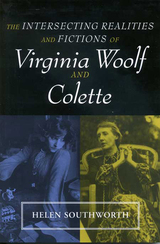
"An important, cogently argued, subtle and rich study of a topic of great interest."
--Mieke Bal, University of Amsterdam
"A work of literary studies positioned at the intersection of tradition and innovation. Evelyne Ender's book brings fashionable cultural concerns to bear on traditional literary texts-her superb pedagogical skills lure and guide the reader through the most difficult psychoanalytical concepts."
--Nelly Furman, Cornell University
Evelyne Ender is Professor of French Studies, University of Washington. She is the author of Sexing the Mind: Nineteenth-Century Fictions of Hysteria.

There are separate languages to be understood in the writings of French and English Romantics, Margery Sabin tells us. Instead of minimizing the importance of national characteristics, as comparatistes frequently do, she demonstrates that national traditions of thought and language have a determining influence throughout the Romantic period. In tracking the differing courses pursued by the best French and English writers of the period, she shows that the idea of the transcendental imagination never took hold among the French-Romantics; that Wordsworth's ideal of the marriage between mind and nature did not inform the vision of the French, who were preoccupied with the isolated human spirit thrown back on its own resources of conscience or faith.
A detailed and far-ranging comparison of Rousseau's Confessions and Wordsworth's Prelude establishes her provocative argument. The idea gains force from the wealth of examples that follow. Sabin examines Wordsworth, Coleridge, and George Eliot as representative of varieties of English Romanticism in the genres of lyric poetry, critical theory, and the novel. Contrasts between these writers and Hugo, Baudelaire, and Flaubert offer new and more precise ways of understanding both Romanticism and later departures from it. Her sensitive readings of Pascal, La Rochefoucauld, Addison, Samuel Johnson, Gerard Manley Hopkins, Thomas Hardy, Yeats, T. S. Eliot, and others yield further evidence. This fresh critical perspective will generate further thought about major writers and about national differences in literature.



Placing novels in the context of eighteenth-century writing about theater, fiction, and painting, Marshall argues that an unusual variety of authors and texts were concerned with the possibility of entering into someone else's thoughts and feelings. He shows how key eighteenth-century works reflect on the problem of how to move, touch, and secure the sympathy of readers and beholders in the realm of both "art" and "life." Marshall discusses the demands placed upon novels to achieve certain effects, the ambivalence of writers and readers about those effects, and the ways in which these texts can be read as philosophical meditations on the differences and analogies between the experiences of reading a novel, watching a play, beholding a painting, and witnessing the spectacle of someone suffering. The Surprising Effects of Sympathy traces the interaction of sympathy and theater and the artistic and philosophical problems that these terms represent in dialogues about aesthetics, moral philosophy, epistemology, psychology, autobiography, the novel, and society.
READERS
Browse our collection.
PUBLISHERS
See BiblioVault's publisher services.
STUDENT SERVICES
Files for college accessibility offices.
UChicago Accessibility Resources
home | accessibility | search | about | contact us
BiblioVault ® 2001 - 2024
The University of Chicago Press









